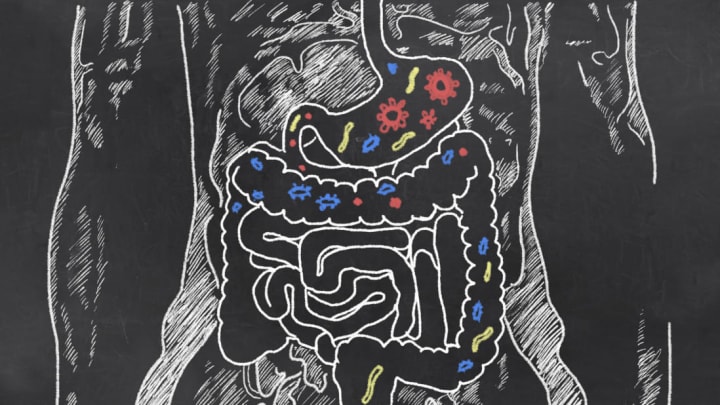8 Surprising Facts About the Stomach

The human body is an amazing thing. For each one of us, it's the most intimate object we know. And yet most of us don't know enough about it: its features, functions, quirks, and mysteries. Our series The Body explores human anatomy, part by part. Think of it as a mini digital encyclopedia with a dose of wow.
While you may only think of your stomach when you're eating or it catches your attention with a gurgle or burble, it's much more than a repository for the food you eat. Your stomach kills microbes, secretes hormones and mucus, and absorbs nutrients. Here are eight gut-clenching facts you might not have known:
1. IT HAS SOME SERIOUS STORAGE CAPACITY.
Your stomach at rest holds about 7 ounces of stomach acid and bile. However, it has the capacity to hold nearly a half-pound of food at a time if necessary. (The average capacity is about 32 ounces, or a quarter-gallon.) It normally takes from four to six hours to digest one meal, so this capacity can be important.
2. PH BALANCE AND MUCUS PREVENT ACID FROM CORRODING YOUR STOMACH.
"Thanks to the high production of hydrochloric acid, which is highly potent, the stomach regenerates its lining frequently," says Sydney Ziverts, a health and nutrition investigator for ConsumerSafety.org. The stomach cavity has a powerful protective process in place that normally keeps the pH of the stomach balanced. Potassium ions help to modulate the hydrochloric acid, and the stomach lining itself produces high numbers of goblet mucus cells to protect the lining.
3. IT ALLOWS YOU TO ABSORB THE CRUCIAL VITAMIN B12 OUT OF YOUR FOOD.
Your stomach is responsible for helping to release the crucial vitamin B12 [PDF] from the proteins you eat. Hydrochloric acid and an enzyme called pepsin break the locked B12 out of its protein so it can be absorbed into your blood stream. "The metabolism of vitamin B starts in the stomach in the parietal cells," Lisa Ganjhu, associate professor of gastroenterology and hepatology at NYU Langone Medical Center, tells Mental Floss. Vitamin B "is one of the main vitamins in our body to help with metabolism and energy production," she says.
4. IT'S A HORMONE-GENERATING MACHINE.
Eating and digesting your food is most likely something you never have to think about. Yet your GI tract is home to a veritable orchestra of hormones stimulated by epithelial cells that line the stomach and small intestine. These hormones engage in a wide range of functions, including stimulating appetite, encouraging the secretion of enzymes and gastric acid, and reminding the gall bladder to contract and empty. These hormones directly enter the blood, and eventually affect the function of other parts of the digestive system, including the liver and pancreas, and even your brain.
5. YOUR STOMACH IS ONE OF YOUR IMMUNE SYSTEM'S FIRST LINES OF DEFENSE.
Besides just digesting your food, the stomach helps protect your entire body. "The acidity in our stomach helps to sterilize whatever you're eating. It kills off bacteria and potential food toxins," says Ganjhu. Your gastrointestinal tract also has patches of lymphoid defense cells it sends out when something makes it through the stomach, such as a virus or bacterial infection.
6. AND IT MAY PLAY A PART IN YOUR MOOD, TOO.
Your stomach may very well be a key player in keeping your mood balanced. New research suggests links between the gut microbiome—the microorganisms that live in any environment—and your mental health. A recent study in the Journal of Psychiatric Research found that transferring the gut microbiota of depressed human patients into rats induced depressive symptoms in the rodents, opening up a whole new realm of possible bacteria-based treatments.
7. STOMACH FLU ISN'T ACTUALLY A FLU.
If you've ever had the misfortune to find yourself stranded by the toilet for 24 to 48 hours purging the contents of your stomach, you may have described the cause as a stomach flu. However, actual influenza is primarily a respiratory infection. What keeps you in the bathroom is likely some form of norovirus or rotavirus, which causes gastroenteritis of the stomach and intestines, and usually resolves in one to two days.
8. THE MOST COMMON CAUSE OF STOMACH ULCERS IS LIKELY BACTERIAL.
The causes of ulcers have perplexed medical researchers for years. However, recent studies have found a link between the bacteria H. pylori and inflammation of the stomach lining, gastritis, and ulcers. In fact, new research suggests that the bacteria may also be linked to stomach cancer.